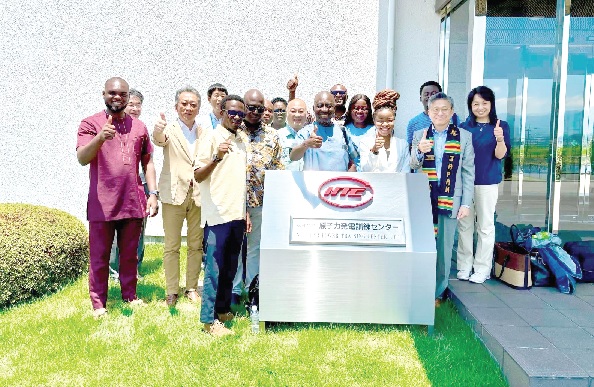
Atomic energy initiates technical cooperation with Japan
The Ghana Atomic Energy Commission (GAEC) has initiated technical cooperation with the International Cooperation Centre of the Japan Atomic Industrial Forum (JAIF) to facilitate knowledge transfer to develop the competencies of Ghanaian professionals in nuclear science and technology.
The initiative is in line with the Ghana Nuclear Programme Infrastructure Development agenda.
The objective of the cooperation is to provide “cooperation for nuclear energy development effectively and efficiently and to serve as a contact window and facilitator towards promoting concrete cooperative activities such as the dispatching of nuclear experts, inviting trainees, hosting seminars,” among others, both within and outside Japan.
A Ghanaian delegation recently visited Japan in connection with the technical cooperation to understudy advanced safety measures of nuclear power plants.
The team consisted of 10 individuals from technical agencies, public and private sectors and the media.
The delegation was headed by a Board Member of the Nuclear Power Institute, Ernest Owusu-Afari.
Ghana’s nuclear energy programme is intended to boost the nation’s industrialisation, digitalisation and overall developmental agenda.
Technical visit
The technical visit aimed at building the capacities of participants on advanced nuclear safety and the technology of nuclear power plants and in this particular case, the Japanese nuclear power programme, which was from July 1 to 6, 2024.
The delegation visited nuclear facilities such as the Tsuruga Nuclear Power Plant, the JAPC Mihama Nuclear Emergency Assistance Centre (M-NEACE), the Nuclear Power Training Centre (NTC), the Fukui Nuclear Centre At Home, the JGC/IHI Holding nuclear collaborative effort, Japan Atomic Energy Agency (JAEA), and enjoyed the tutelage of experts such as Hiroki Takimoto and Toshihiro Yamakawa (both General Managers of JAIF International Cooperation Centre), Kurauchi Hironobu (Deputy Superintendent, Tsuruga Power Station), among others.
It was left with a far deeper understanding and appreciation of the intricacy yet simplicity of nuclear power, the chequered past yet straightforward propitiousness of nuclear energy in the modern world, and the enduring importance of nuclear power programmes to national economies, particularly to developing economies such as Ghana.
Impact
Board Member of the NPI and Head of the delegation, Ernest Owusu-Afari, capped the impactful five-day visit saying: “The power of the atom is the gift of the creator to humankind. It exists for us to exploit, just like all other natural phenomena and resources.
But of course, in our utilisation of such resources, we must always exercise the necessary cautions for the benefit of ourselves and that of the generations yet unborn.”
“Nuclear energy continues to be utilised worldwide — by the developed and developing world alike. Ghana has no reason to be fearful of it. Nuclear power is an indispensable alternative source of energy — especially in this era where climate change remains one of the world’s greatest concerns.
“We should have the self-belief that just as nations of the world have employed nuclear power for their national growths, so can we,” he added.
